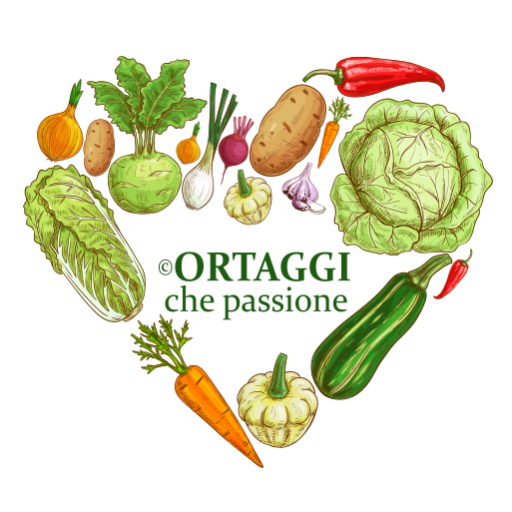Grandma Benedetta’s pasta and beans is a simple and creamy recipe, a symbol of tradition that embraces the essence of the Mediterranean diet. I prepare it with all types of legumes, but the borlotti bean remains the original and distinctive ingredient of this preparation. A quick soup in the pressure cooker or slow-cooked in the traditional pot.
SEASON of #drybeans (borlotti, cannellini, white beans, red, black) – they are available all year round, I recommend consuming them within 12 months of production.
RECIPES with borlotti beans
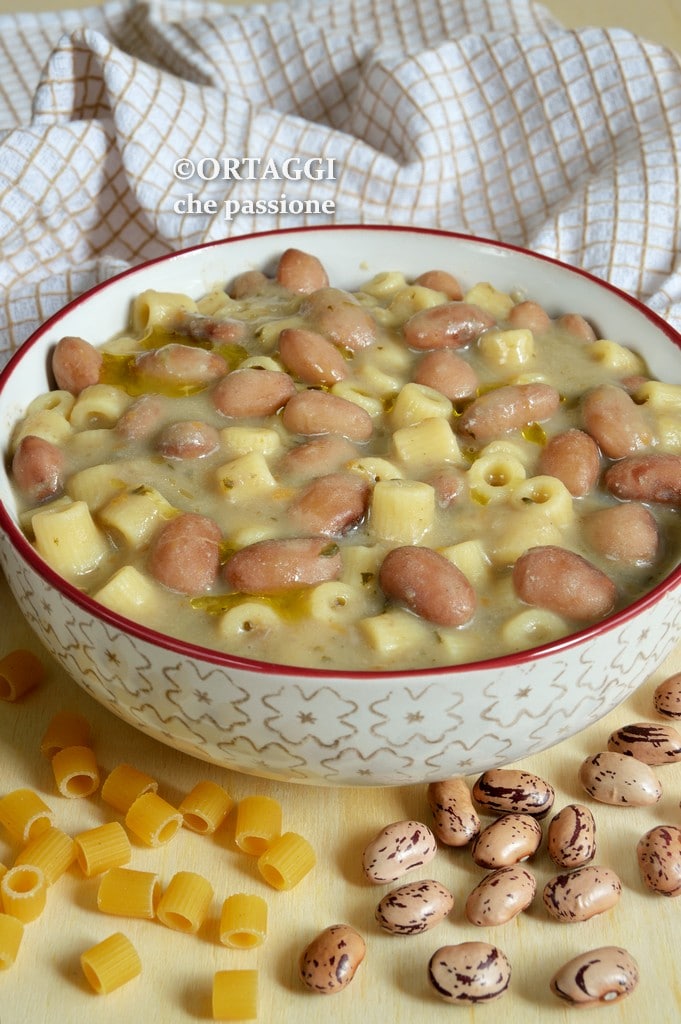
- Difficulty: Easy
- Cost: Economical
- Rest time: 12 Hours
- Preparation time: 30 Minutes
- Portions: 6
- Cooking methods: Stove, Pressure Cooker
- Cuisine: Italian
- Seasonality: Fall, Winter, and Spring
- Energy 329.05 (Kcal)
- Carbohydrates 58.60 (g) of which sugars 3.60 (g)
- Proteins 15.03 (g)
- Fat 3.74 (g) of which saturated 0.45 (g)of which unsaturated 0.43 (g)
- Fibers 9.16 (g)
- Sodium 344.35 (mg)
Indicative values for a portion of 405 g processed in an automated way starting from the nutritional information available on the CREA* and FoodData Central** databases. It is not food and / or nutritional advice.
* CREATES Food and Nutrition Research Center: https://www.crea.gov.it/alimenti-e-nutrizione https://www.alimentinutrizione.it ** U.S. Department of Agriculture, Agricultural Research Service. FoodData Central, 2019. https://fdc.nal.usda.gov
Pasta and Beans
- 9 oz dried borlotti beans (I use Cuneo IGP beans)
- Half onion (about 70 grams)
- 1 carrot (about 50 grams)
- 1 stalk celery (about 15 grams)
- 1 clove garlic (optional)
- 1 tablespoon extra virgin olive oil (can be omitted and use only water for sautéing)
- 2 potatoes (about 220 grams)
- 1 liter water
- 700 ml water (or as needed – you can replace part of the water with tomato sauce)
- 9 oz ditalini pasta (or broken tagliatelle or mixed pasta)
- to taste coarse salt
Before cooking the pasta, you can add tomato puree (or tomato paste) to the pasta and beans.
Tools
- Immersion Blender Moulinex 2in1
- Pressure Cooker Lagostina
- Casserole tall in stainless steel
Pasta and Beans
SOAKING – how long should you soak dry borlotti beans?
To soften dry borlotti beans, leave them to soak for at least 12 hours, it’s convenient to soak them overnight and if possible, change the water at least once. After rinsing them, they are ready to be cooked. During cooking, I recommend adding aromas such as garlic, onion, and herbs (bay leaf, rosemary, sage) for extra flavor and to make them more digestible.
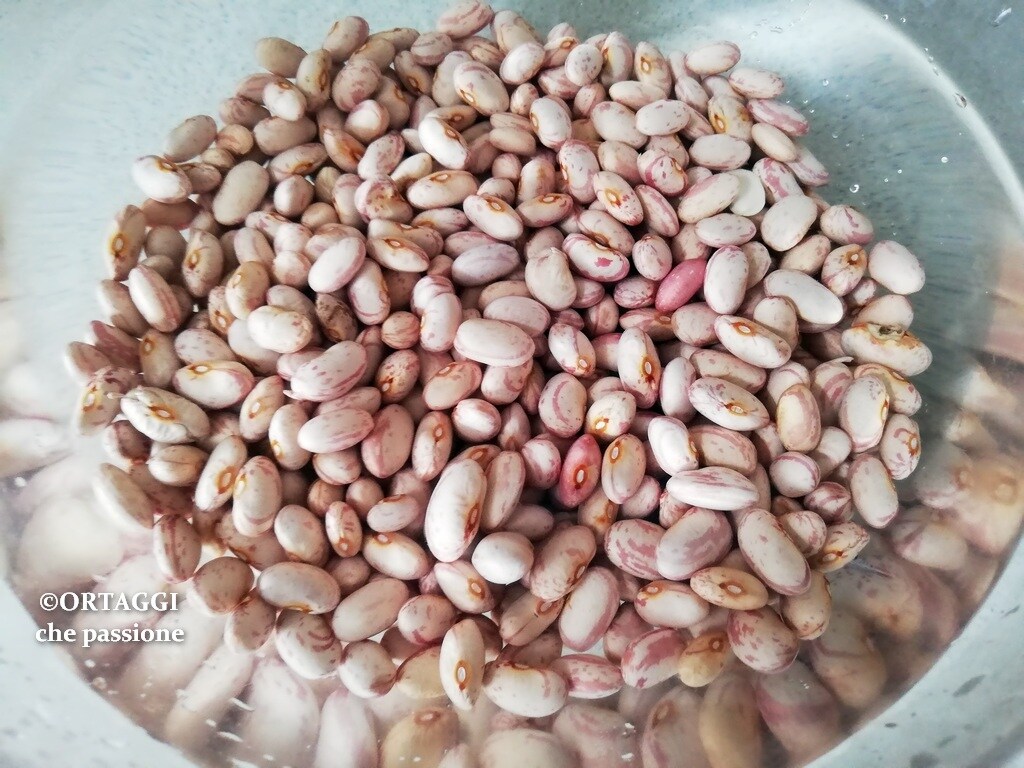
Chop the onion, carrot, celery, and garlic with the electric chopper. Sauté the vegetables with a drizzle of oil and a little water in the pressure cooker (or in a large pan) for about 10 minutes.
For a lighter version, soften the vegetables in water only.
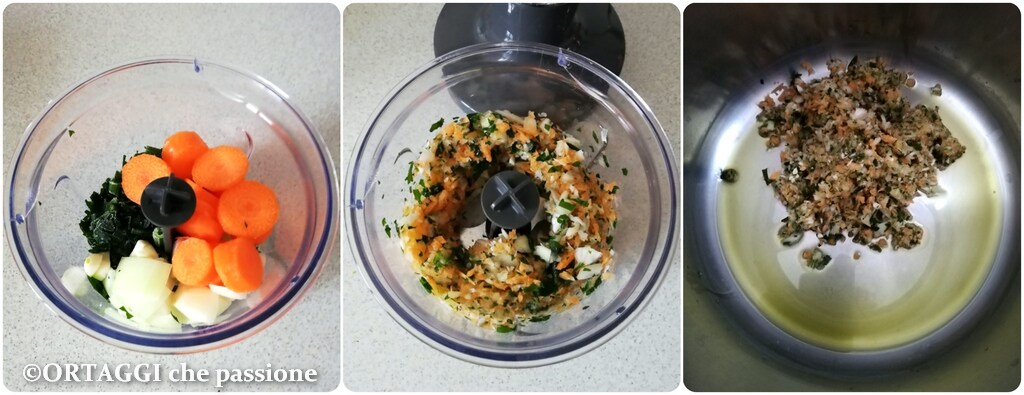
Meanwhile, peel, wash, and cut the potatoes into small pieces. Add them to the sauté and let them flavor for a few minutes.
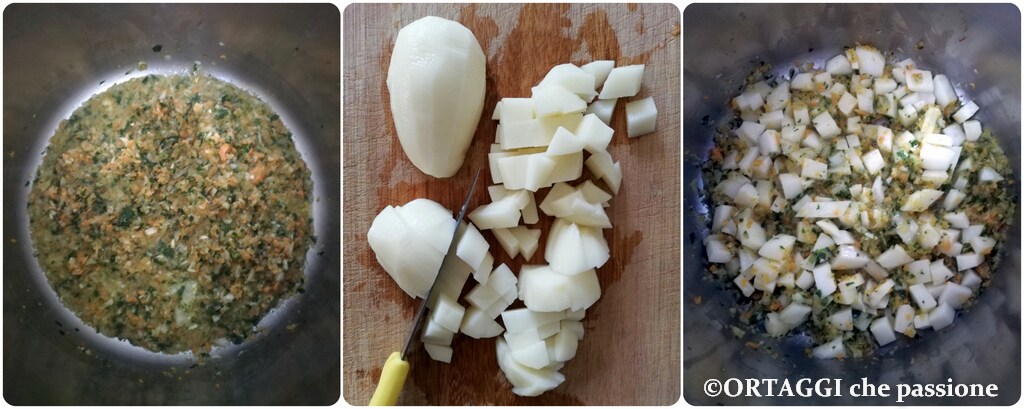
Then drain the borlotti beans from their soaking water and rinse them under running water. Pour them into the pot, let them flavor, and then add the water and preferred aromas (do not add salt or tomato at this moment as they tend to harden the legume skins).
Cook over low heat:
– for 20 minutes from the classic whistle if using a pressure cooker
– for 1 hour if using a steel pan (or an earthenware pot).
The cooking time for dry borlotti can vary from 1 hour to 3 hours, depending on the soaking time (the longer the soaking, the less time in the pot) and their age (the longer since their harvest, the longer the cooking time).
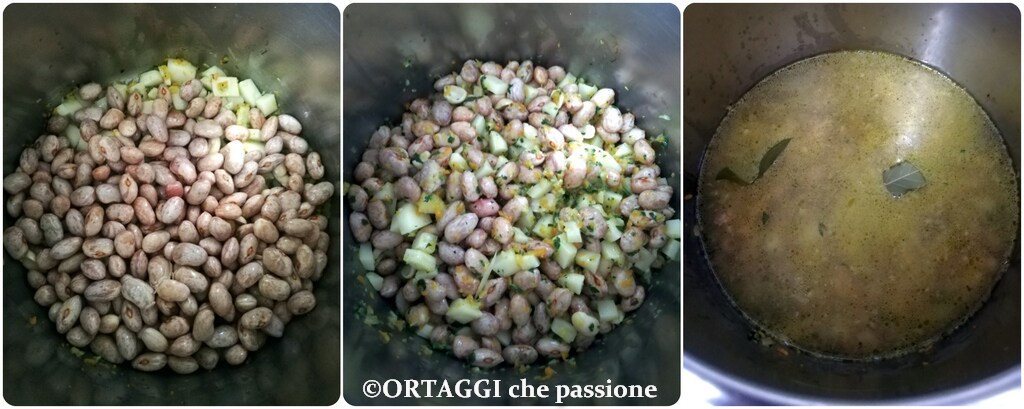
Once the beans are cooked, remove a third (along with the most potato pieces) and part of the broth. Then pour them into the blender jar and puree until creamy.
To speed up, you can also immerse the immersion blender directly into the pot and puree only part of the vegetables. Or remove the nicest beans, puree the vegetable broth, and then add the legumes back.
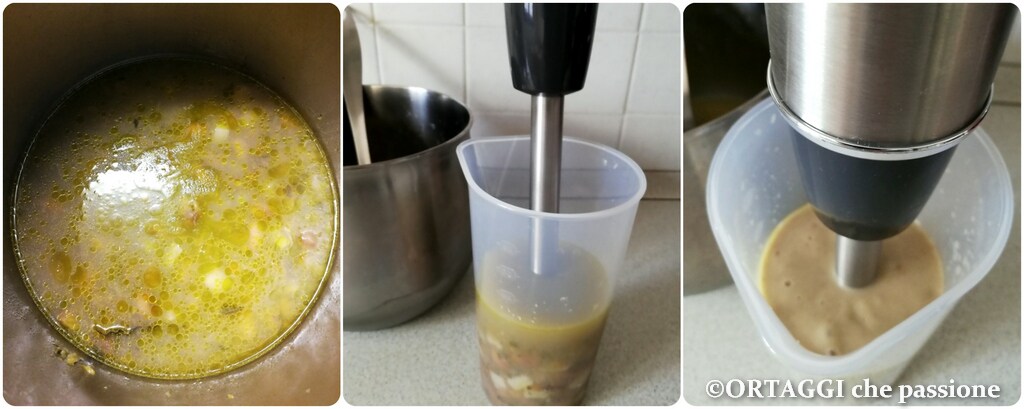
Return the created cream to the pot, salt it, and if necessary, add water and tomato puree. Bring everything to a boil and pour in the ditalini, stirring frequently to prevent the pasta from sticking to the bottom.
Serve the pasta and beans hot.
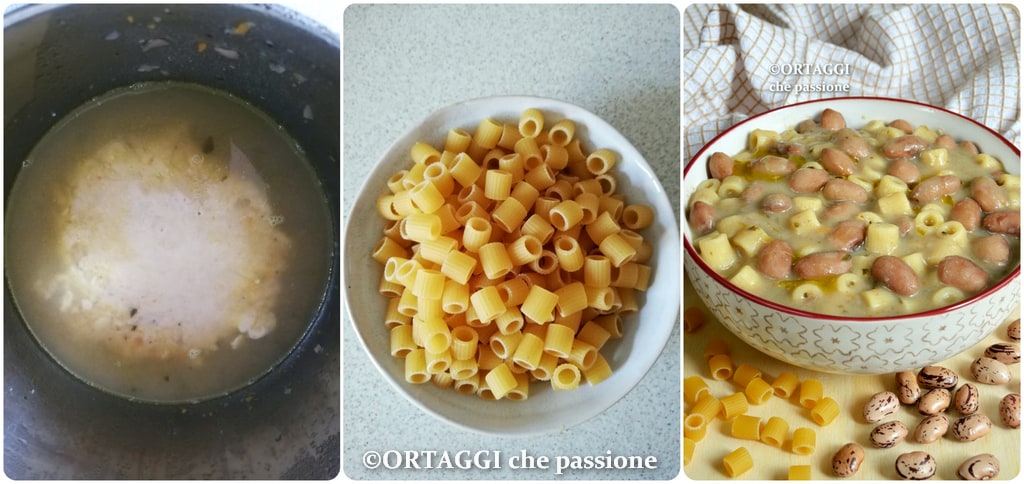
STORING Pasta and Beans
Store only the bean soup in the refrigerator or freezer. Add and cook the pasta just before consumption. The beans with their broth alone can be stored in the refrigerator for 5 days and in the freezer for 6 months.
FAQ (Questions and Answers)
What to eat with pasta and beans?
Pasta and beans is a traditional Italian dish that can be paired with:
– garlic and pepper: adding minced garlic or ground black pepper can intensify the flavor
– olive oil: a splash of good extra virgin olive oil can enhance the dish’s texture
– fresh herbs: sprinkling fresh herbs like parsley, basil, or rosemary can add depth to the flavor
– bread: a slice of toasted bread or crunchy baguette can be great for dipping
– fresh vegetables: a simple green salad or a side of steamed vegetables complete the meal
– cheese (for vegetarians only): adding grated cheese over the pasta and beans can enrich the flavor
– cured meats (for omnivores only): some thin slices of prosciutto or pancetta can add extra flavor.Why can a pasta and beans dish be considered a complete meal?
A pasta and beans dish is complete because it combines carbohydrates from pasta (preferably whole grain) with proteins and fibers from beans. This combination provides sustained energy, essential nutrients, and a good feeling of satiety. Additionally, adding vegetables and seasonings can further enrich the dish with flavors, making it a nutritious and balanced choice.
What should not be paired with beans?
There are some food combinations that might not be ideal with beans; to avoid gastrointestinal discomfort, it is better to exclude:
– acidic fruit: avoid consuming highly acidic fruit, like citrus, alongside beans, as it may cause gastric disturbances
– dairy with cultures: yogurt and kefir, when paired with beans, can cause bloating or intestinal discomfort in some people
– foods high in saturated fats: fatty red meats or fried foods might be difficult to digest if consumed with beans
– cruciferous vegetables: cauliflower, broccoli, and cabbages, in general, can cause flatulence, and if consumed in large quantities with beans, may increase this effect
– very spicy or seasoned foods: strong seasonings can be irritating to the stomach if consumed with beans, so it is advisable to moderate their use.

